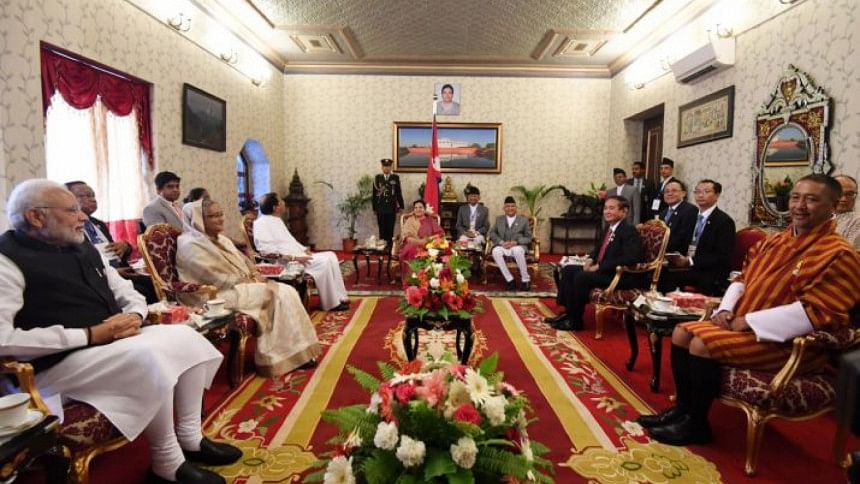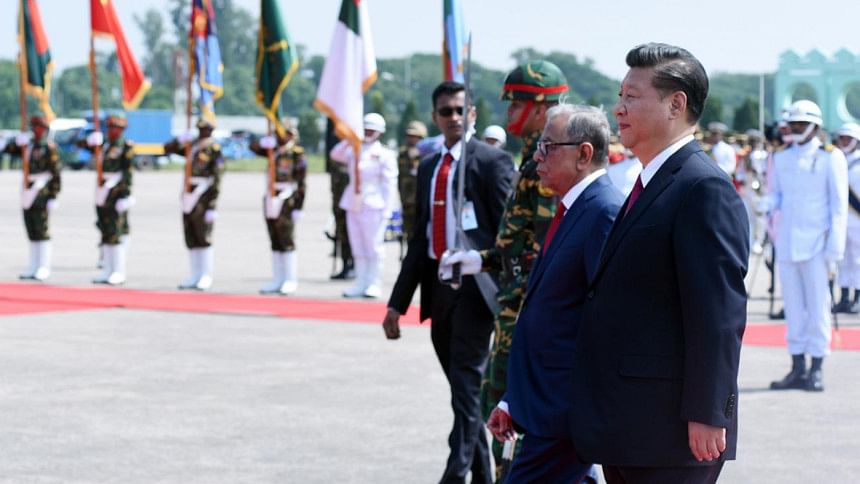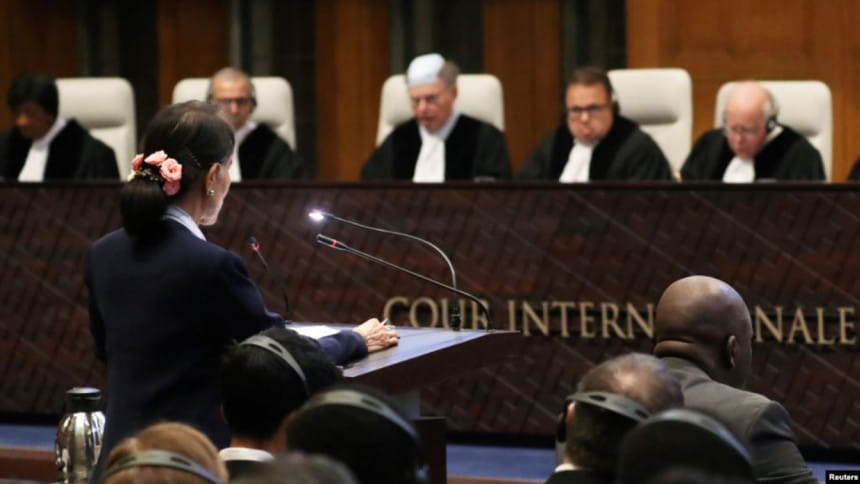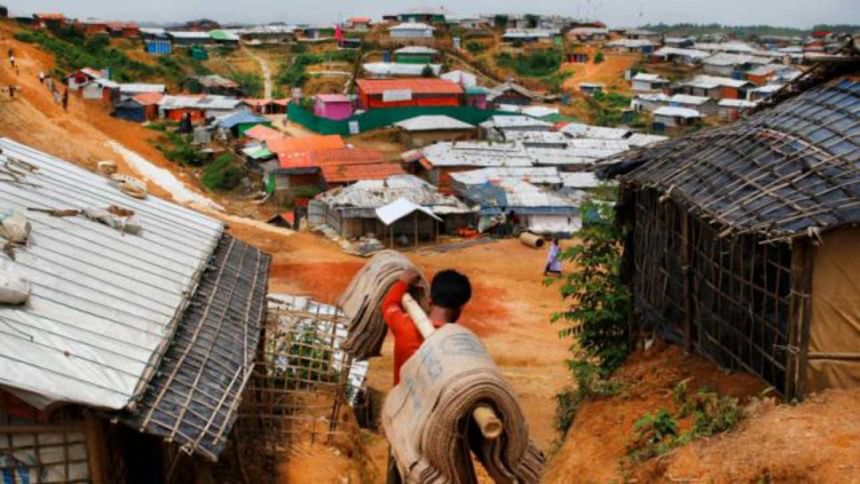Eight points to consider

The political Stockholm Syndrome
Political Bangladesh has shown unfathomed fidelity to its neighbours. Yet, the country has remained hostage to the crisis looming from 1.1 million Burmese refugees, and no water deals along with a legal endorsement of being one of the three states that persecute minorities from its most giant neighbour, India. Bangladesh is still generous enough to consider anti-Bangladesh rhetoric as India's internal affairs. Nonetheless, Bangladesh will have to wrestle against three major neighbourhood cataclysms.
India would be the first one here. Neither CAA nor NRC was stopped, nor the downslope of its economic growth stabilised. The populists made smaller gains than what they expected out of socio-political polarisation, and the biggest propaganda machines—Internet and the media—couldn't firm up its foreign relations with neighbouring countries either. Bangladesh remained as its last cohort in the region. Indian Prime Minister Modi's saffron flavoured government's hiccups may well give political space for internal instability, with potentials for spillover effects on Bangladesh as no credible plan to tackle the economic and political woes are in sight. However, economic growth may recover marginally, but India will struggle to regain enough momentum to come closer to even a stagnant China. The Bangladesh's awkward balancing act between two asymmetric economies—China and India—will continue to be a fallacy.
Instead, to sustain Bangladesh's national interest and stimulate the Indian economy, a more coordinated Bangladesh-China-West tie can help, something that the foreign policy community should think about. At the end of the day, Bangladesh is already the most significant external and political security provider to India, not the other way around.
The Burmese political community will continue to act delusory. The Rohingya issue will still not be their priority, apart from embarking on their periodic genocidal spree. Aung San Suu Kyi will be on the test to prove her Burmese political blood—she needs the Constitution to be amended to climb to the highest point of power. The military will be busy in guarding the Constitution against amendment to ensure 25 percent of the seats in parliament are reserved for them. And of course, this time, its big neighbour—the mandarin dragon—will tame the Burmese generals from going strategically overboard with their newfound friends. Flying high with Pakistani built JF17s is not a substitute to the Burmese generals' romance with an old Russian-built Indian submarine. That too after the Rajapaksas legibly regained their throne and the Nepalese gained alternative paths for their global connectivity. Hence, Bangladesh will have to rethink its complex Burma front if it wants to retain the spirit of ICJ to ensure dignified return of the Rohingyas.
The Bay of Bengal is the third one. The Bay is increasingly becoming the flashpoint for the US-led Indo-Pacific Strategy (with its variants promoted by Japan and India) and the Chinese Belt and Road Initiative (BRI). New waves of investment in the blue economy are rising across the globe, and one can note that ambitious national strategies and laws are being developed to advance industries such as blue finance, blue technologies, marine energy, deep-sea mining, bio-prospecting, sustainable fishing, and responsible eco-tourism. This is where Bangladesh's bureaucratic and military diplomacy should focus on—balancing between two powers—the US and the Chinese.

The home front
Herbert Hoover was a US president who knew that a practical joke would have a more significant impact than talks full of political jargon we fancy. His famous quip was that, "blessed are the young, for they shall inherit the national debt". As uncanny as it may sound, it may well turn out to have particular relevance for Bangladesh in 2020. The rising pressure of non-performing loans will continue to put cracks into the financial systems, and this will add to the not-so-scenic employment scenario in the country. Do we need to nag about the imaginary Chinese Maotai infused debt crisis then?
The Middle East
The Middle East will continue to be Bangladesh's Achilles heel. The Middle East opera will not be ending in decades, which will keep oil supply and labour markets volatile. Hence, the energy sources will remain buoyant too. That too will come with rising arms race as the Iran-North Korea conundrums will make nuclear arms-control agreements fray. And one should watch out for Vladimir Putin and Tayyip Erdogan's ever-increasing appetite for power expansion across the Middle East and beyond.
The new Far East
China, Japan, and South Korea will continue to regain their long-lost bonds while celebrating the Tokyo Olympic. While the Chinese leadership will score significant wins in the power games in the Russia-Turkey-Iran-Syria, Qatar-Saudi-Israel equations, Africa, Central Asia, and the Pacific, newer regional pacts will be strategically soothing for the Asian countries. Not to mention, in December 2019, the South Korean President Moon Jae-in acknowledged Hong Kong and Xinjiang as China's "internal affairs" and endorsed President Xi Jinping's jingle—"shared future" for humanity. For sure, President Xi had the last laugh in 2019 while the House of Representatives happily impeached Donald Trump knowing that the Senate and the economic stability in the US will let him breathe well. Xi will visit Tokyo, and Tokyo will dispatch its Self-Defense Force to Middle Eastern waters in support of the US! That's a new form of balancing act! Prime Minister Shinzo Abe will also visit the Middle East, including Saudi Arabia and the United Arab Emirates, to seek their support for the dispatch of the SDF personnel.

The renewed multilateralism
Asean will remain crunched by internal political divides, security challenges stemming from Myanmar to drugs to ultra-nationalism, lack of economic integration, and poor human rights record. This also calls for Bangladesh to push for expanding BIMSTEC—the only somewhat functional regional organisation with participation of South Asian countries, with two Southeast Asian compadres Myanmar and Thailand. Malaysia, Singapore and Indonesia can be invited to lend hands in strengthening BIMSTEC. The near-east and the Pacific will witness significant changes in 2020, enough impetus for the trio to be a part of BIMSTEC. OIC will continue to be a trusted friend along with the UN. But again, that will depend on how much strategic autonomy Bangladesh will exercise using its growth momentum and political maturity.
Politics of information
The fourth industrial revolution will then be another factor for Bangladesh. The tech-infused global geopolitical equations will change the business as usual mode. Tech brings jobs, and it kills some of them too! It brings radical development, so it also brings radical public movements! The state monopoly of power is mostly fading, and the utility of government-sponsored sycophants are long gone. The sooner we understand this, the better it would be. As the attempts to blanket corruption and misgovernance will rise, disinformation, fake news, and alternative media will continue to increase in parallel. Hence, it will be of no surprise to see more collective online and offline assertive resentments. Mainstream television media will be significantly replaced by online media, causing a fracture to traditional sources of journalism, much owing to tech and lack of creativity at this time.

Disruptive technologies and the markets
The proliferation of end-user prescriptive analytics in 2020 will change the political and foreign policy decision-making processes. Hence, geopolitics will get a new shape with data being used to make predictions about future events and behaviour. Mobile commerce and news, AI, Chinese led 5G network, mid-market tech growth and automation will rapidly create asymmetric economic parity in Asia. The RMG sector will increasingly embrace automation to comply with the rapidly changing global supply chain leading to job loss. That will come along with Brexit, which will change the pride of EU's supranational character. White supremacists and European ultraright nationalists will put a scar on western liberal politics. The volatility of NATO is on full display, with a leadership vacuum which makes it further clear that Moscow and Beijing will continue expanding their global military footprints. That means—old markets for human resource export and RMG export for Bangladesh will not only become constrained, but the new markets will also become restricted.
The usual suspects
2020 is likely to represent a tipping point, as the institutional weaknesses and corruption can rupture the security backbone—cyber or physical. Rogue actors, regardless of whether they are terrorist groups, lone wolves, criminal gangs, and proxy insurgents with loose or overt state ties, are presently the leading navigators of money laundering, transnational extremist ideologies, and cyber threats. Without a firm commitment to combat illicit channels and political corruption, the security costs will be astronomically high from Dhaka to Teknaf.
The task is then a colossal one. And completing it would require augmenting the best brains and cognitive skills of the nation! That will not be possible without the best, and the brightest minds, being in the right places—be it in civil service or politics or academia.
The foreign policy community will have to think their policies from a greater geopolitical landscape with human resources able to connect the dots. And the political community should introduce checklists to evaluate their performance. Perhaps what should be reminded to state actors is that global politics will witness anarchy where the regional powers will be aiming at degrading strategic autonomy and sovereignty of the competing economies. Hence, we should be prepared to return to a pre-Westphalian decade.
Shahab Enam Khan, Professor, Department of International Relations, Jahangirnagar University, Bangladesh. Email: [email protected]





Comments